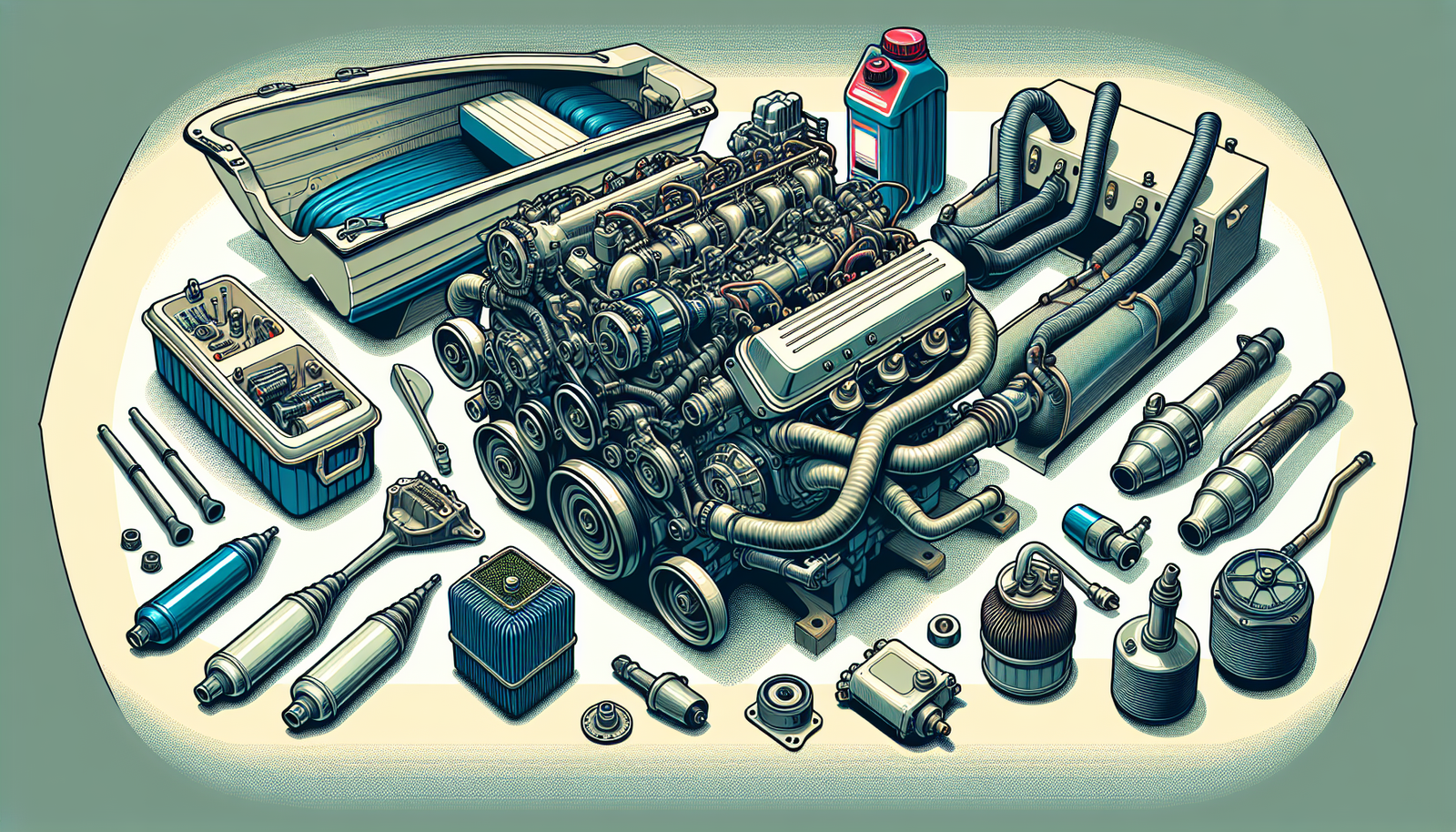Navigating the vast sea of boat engine accessories can be a daunting task. Whether you’re a seasoned sailor or a novice on the nautical scene, ensuring your vessel remains in top-notch condition is crucial. This article explores essential boat engine accessories that every boat owner should consider. From engines to exhaust systems, understanding the importance of each accessory is the key to stay afloat.
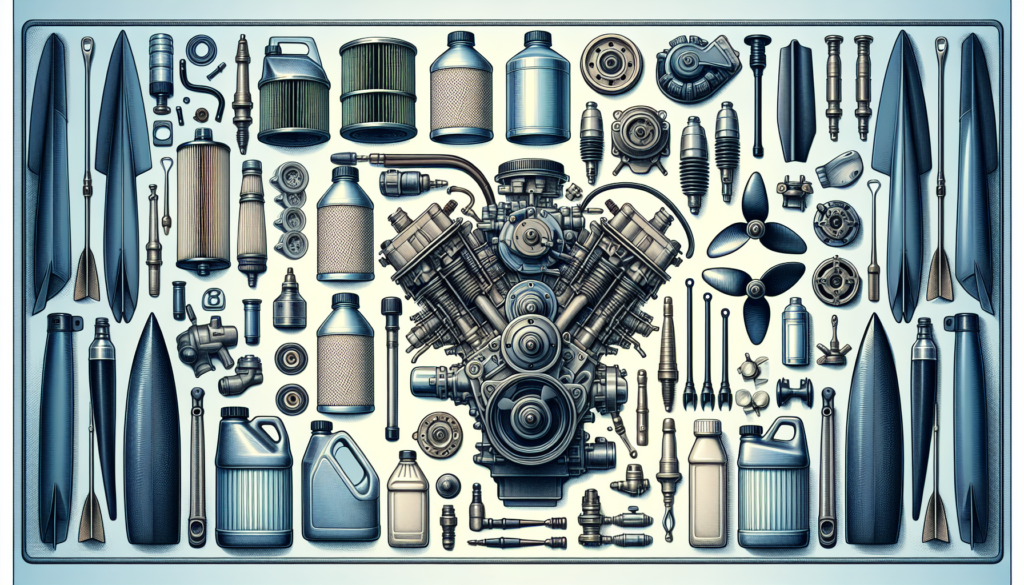
Fuel Management System
Let’s start with fuel management systems, something that is incredibly vital yet often overlooked. You see, in order for your boat to perform at its best and to avoid unexpected frustrations during your sea voyage, a good fuel management system is critical.
Importance of Fuel Management System
So, why do you need a fuel management system? A robust fuel management system keeps track of the fuel consumption in your vessel. It helps prevent theft, minimizes fuel costs, optimizes fuel delivery, and offers valuable data that could help improve operational efficiency. It’s a bit like a financial budget for fuel.
Types of Fuel Management Systems
There exists a variety of different types of fuel management systems. The most common include Card-based systems that require a specific card or key for operation; On-site fuel management systems that control fuel dispensing on your property, and Total fuel management systems that manage all aspects of fuel storage, dispensing, and usage.
Choosing the right Fuel Management System
Now, onto the question of how to choose the right fuel management system. Well, it depends on your vicinity requirements, budget, and the size of your fleet. Understand your unique needs, compare different systems, and consider factors such as accuracy and reliability.
Engine Mount
Next on the queue is the engine mount. Underappreciated as they are, engine mounts play a crucial role in the smooth functioning of your boat’s engine.
The role of Engine Mount
Think of engine mounts as the unsung heroes of your boat’s engine. They’re essentially a type of vibration isolator that provides a barrier between the engine and the boat, reducing vibrations and noise levels. Plus, they maintain the alignment of the engine and shaft, which prevents undue stress on the other components.
Selecting appropriate Engine Mount
When selecting an engine mount, keep in mind that not all mounts are created equal. You have to consider factors like the weight of the engine, the operational RPM, and the geometry of the engine beds. Additionally, look for mounts made of durable materials that can resist oil, fuel, and water.
Maintenance of Engine Mount
As for maintenance, check your engine mounts regularly to avoid issues down the line. Look for cracks on the rubber, bulging under load, or corrosion on the metal parts. When trouble arises, prompt repairs or replacements are crucial.
Marine Battery
Ah, the marine battery – the heart of your boat’s electrical system.
Understanding Marine Battery
A marine battery supplies the necessary power to start your boat’s engine and run all the electrical systems. It differs from your car battery in its construction and functionality, providing both a burst of power for the start-up and sustained power for onboard systems.
Types of Marine Batteries
There are generally three types of marine batteries: Starting batteries for cranking the engine, deep cycle batteries for continuous power supply, and dual-purpose batteries that offer a combination of these two capabilities.
Installation and maintenance of Marine Battery
In terms of installation, always ensure the battery is securely mounted and the terminals are protected from corrosion. For maintenance, regularly check the battery’s charge level, clean the terminals, and keep it properly charged during off-seasons.
Oil Filters
Moving forward, let’s delve into oil filters—yes, these seemingly insignificant parts carry a significant job.
Function of Oil Filters
Oil filters help keep your boat’s engine clean by removing any potentially harmful particles and contaminants from the oil. Essentially, they ensure a smooth, unimpeded oil flow, thereby preventing premature wear and tear of engine components.
Types of Oil Filters
There’s more than one catch-all oil filter. They come in different types: spin-on filters, cartridge filters, and magnetic oil filters, each with its pros and cons.
Choosing and replacing Oil Filters
Choosing the right oil filter involves matching it to your engine’s specifications and your boating habits. Meanwhile, regular replacement is key—as a rule of thumb, change your oil filter with every oil change to ensure maximum engine performance.
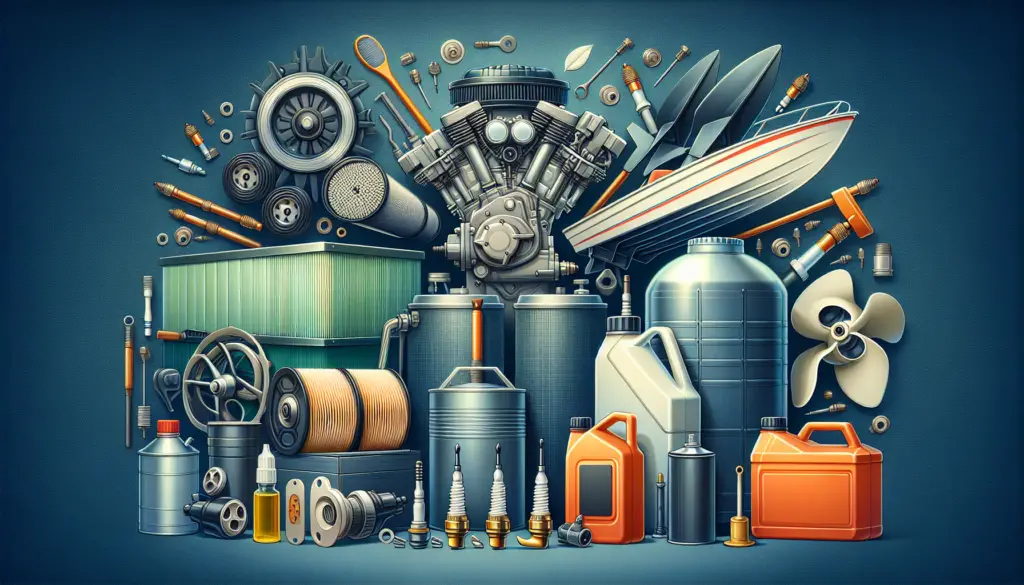
Alternators and Charging Systems
Now let’s shift gears to alternators and charging systems—a pivotal part of your boat’s electrical power sources.
Understanding Alternators and Charging Systems
The alternator, in conjunction with the charging system, is crucial in powering your boat’s electrical systems and replenishing the battery after starting. It’s a bit like the generator of your boat’s electrical power.
Selecting an efficient Alternator
Choosing an alternator involves considering the power rating, which should match your electrical load, as well as the physical size, ensuring it fits your engine compartment. Efficiency and durability are also important considerations.
Maintaining your Boat’s Charging System
In terms of maintenance, regular checks on the charging system and alternator can help spot early signs of wear. Cleaning the connections, checking the belt tension, and ensuring the alternator isn’t overheating can keep it in good shape.
Starters and Solenoids
Among the essential boat components are starters and solenoids—critical elements in getting your boat’s engine running.
Understanding the role of Starters and Solenoids
The starter is responsible for the initial crank of your boat’s engine. It does this with the help of energy from the battery, which is controlled by the solenoid. In essence, the solenoid acts as the switch that delivers the battery’s energy to the starter motor.
Types of Starters and Solenoids
There are numerous types of starters and solenoids, with the most common ones being series-parallel switch systems, magnetic switch systems, and electro-magnetic relay systems. Your unique boating needs will dictate the ideal type for you.
Maintenance tips for Starters and Solenoids
It’s vital to note that preventive maintenance goes a long way in avoiding starter and solenoid issues. This includes checking for corrosion, ensuring the battery is in good condition, and seeking professional help for necessary repairs or replacements.
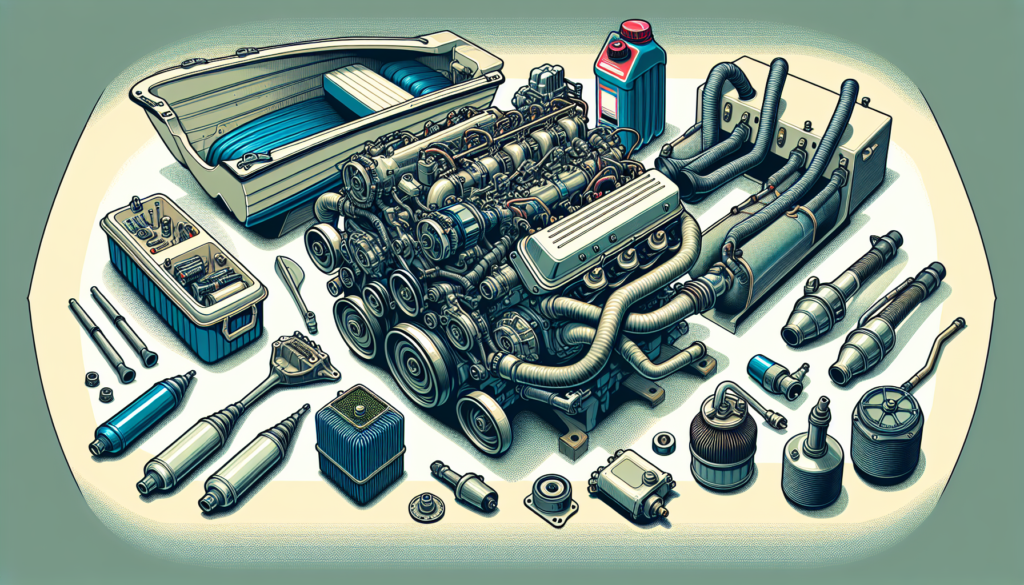
Water pumps and impellers
Water pumps and impellers are essential pieces of equipment on any boat. They keep your engine cool and prevent overheating.
Importance of Water pumps and impellers
A water pump, using impellers, circulates water through the engine’s cooling system, keeping it at the right temperature. Without these parts, your engine could overheat, causing serious damage and potentially dropping you in hot water!
Different types of Water pumps and Impellers
There are several types of impellers – flexible impellers, semi-rigid impellers, and rigid impellers, to name a few. The water pumps can also differ in terms of operation – you can have mechanical water pumps or electric ones.
Choosing and maintaining Water pumps and impellers
When choosing a water pump, consider factors like the flow rate, pressure capabilities, and compatibility with your engine. As for the impellers, the material and the number of blades are critical. Routine replacement and regular checking of the impellers for wear can significantly improve their lifespan.
Engine Cooling Systems
Let’s now shed some light on the engine cooling systems – a safeguard of your boat’s engine.
Why Engine Cooling Systems are essential
An engine cooling system’s main job is to maintain the engine at an optimal operating temperature, avoiding overheating, and subsequently, engine damage. Thus, it’s as essential as it gets.
Types of Engine Cooling Systems
The most common types of cooling systems in boats are raw water cooling systems and fresh water (or closed) cooling systems. Each has its advantages and considerations that make them suitable for different types of vessels and operating conditions.
Maintenance of Engine Cooling Systems
Maintaining your cooling system generally means keeping all its parts, including the thermostat, hoses, and coolant, in good condition. Checking the system regularly, keeping an eye for leaks and ensuring the coolant level is sufficient are important parts of the upkeep.
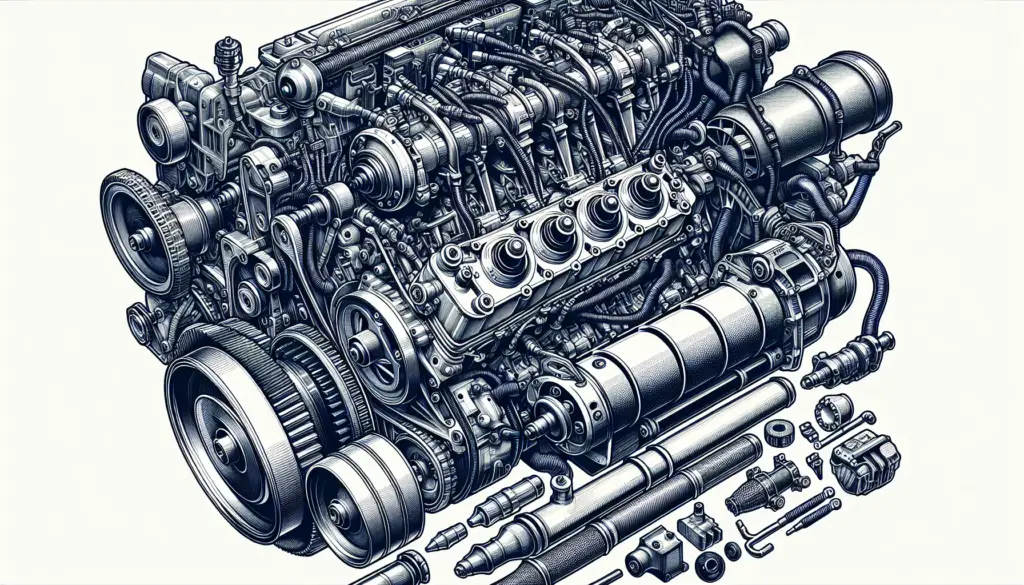
Propellers
No discussion of boat engines is complete without mention of propellers. They’re the driving force behind your boat’s movement.
Understanding Boat Propellers
A boat propeller is like the wheels to your car. It transforms the power from your engine into thrust, moving your vessel through the water. Each blade’s design and rotation create a pressure difference, which produces the needed thrust.
How to select the right Propellers
When choosing a propeller, consider its size, pitch, number of blades, and material. The right choice depends on your boat’s size, your engine’s horsepower, and how you use your boat.
Maintaining Propellers
Proper propeller maintenance involves regular inspection for damage and ensuring the propeller is securely fastened. If you notice dings, nicks, or any other signs of damage, a propeller repair professional’s services may be necessary.
Exhaust Systems
Finally, let’s talk about exhaust systems – an important aspect of engine operations.
Understanding the need for Exhaust Systems
The exhaust system performs a crucial job: it expels the combustion gases produced by your engine out of the vessel. This helps your boat’s engine to run effectively and efficiently, all while keeping you safe from harmful emissions.
Different types of Exhaust Systems
There are generally two types of exhaust systems in boating: wet exhaust systems and dry exhaust systems. A wet system mixes the gases with cooling water before expelling them, while a dry system does not.
Maintenance and safety issues with Exhaust Systems
Regular checks and cleaning are pivotal for keeping the exhaust system in top shape. Routinely examine the system for leaks, corrosion, or damage. Plus, remember that a faulty exhaust system can potentially allow deadly carbon monoxide into your boat, hence the need for utmost caution and regular maintenance.

